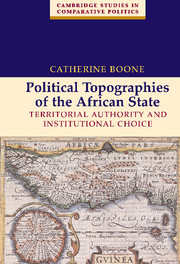Book contents
- Frontmatter
- Contents
- List of Maps, Tables, and Figures
- Preface and Acknowledgments
- 1 INTRODUCTION
- 2 MAPPING POLITICAL TOPOGRAPHY IN AFRICA
- 3 UNEVEN INSTITUTIONAL TOPOGRAPHY WITHIN ONE STATE
- 4 TAXING RICH PEASANTS: REGIME IDEOLOGY AS STRATEGY
- 5 THE GEOPOLITICS OF LATE DEVELOPMENT
- 6 CONCLUSION
- Appendix: A Note on Sources, Evidence, and Measurement
- References
- Index
- Cambridge Studies in Comparative Politics
1 - INTRODUCTION
Published online by Cambridge University Press: 26 December 2009
- Frontmatter
- Contents
- List of Maps, Tables, and Figures
- Preface and Acknowledgments
- 1 INTRODUCTION
- 2 MAPPING POLITICAL TOPOGRAPHY IN AFRICA
- 3 UNEVEN INSTITUTIONAL TOPOGRAPHY WITHIN ONE STATE
- 4 TAXING RICH PEASANTS: REGIME IDEOLOGY AS STRATEGY
- 5 THE GEOPOLITICS OF LATE DEVELOPMENT
- 6 CONCLUSION
- Appendix: A Note on Sources, Evidence, and Measurement
- References
- Index
- Cambridge Studies in Comparative Politics
Summary
Changes sweeping sub-Saharan Africa have rekindled interest in popular politics, local communities, and institutional reforms that might decentralize and democratize everyday political life. Activists and observers voice hopes for political devolution and forms of democracy that can empower ordinary citizens and producers. Yet on a continent where 50 to 70 percent of the population remains rural, such hopes are often tempered by skepticism about African rulers' willingness to empower the rural masses, and uneasiness and ambivalence about the political impulses and potential of African peasant society. Do farmers and villagers really represent the core of African political community, “the inner strength of society”? Or is rural Africa reactionary and despotic, the mainspring of xenophobias and destructive subnationalisms? When we look at today's villages of farmers, traders, and chiefs, do we see the democratic antithesis of the authoritarian state or local despotisms that have been reinforced – or even created – by modern forms of rule? These are questions about power, political capacity, and state institutions in rural Africa. They have implications for how we understand African state building, for formulating and justifying strategies for institutional reform, and for envisioning Africa's economic future.
This book engages questions about power and political capacity in rural Africa. How is politics configured at the local level? How do rulers choose strategies for governing the countryside, and when do strategies change? Answers matter, for they can help explain the variation we observe in core-periphery relations within and across African countries.
- Type
- Chapter
- Information
- Political Topographies of the African StateTerritorial Authority and Institutional Choice, pp. 1 - 10Publisher: Cambridge University PressPrint publication year: 2003

